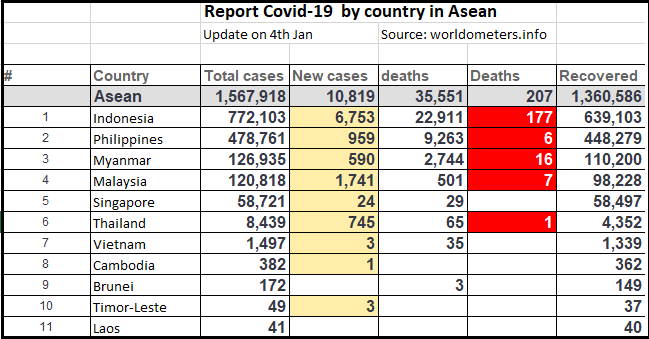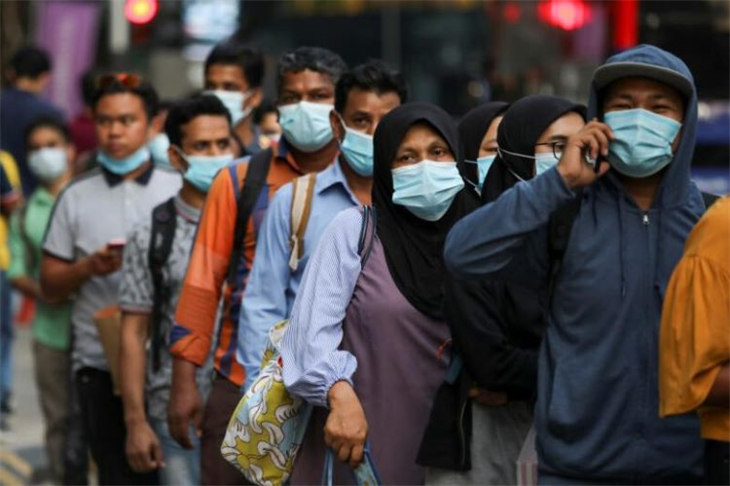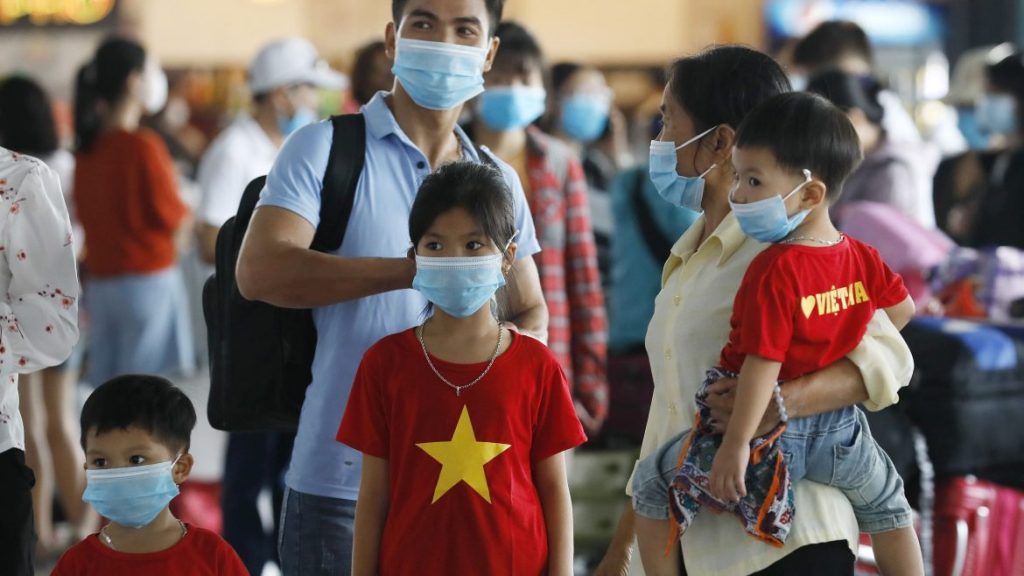More Serious Coronavirus Outbreak among ASEAN Countries
Updated on 4th Jan.
The current novel coronavirus outbreak is more serious among ASEAN countries. Currently, eight countries have reported new cases; Thailand had its first death after many months. In recent cases in ASEAN, scientists found the contagious coronavirus variant linked to a recent surge in cases in England. The new variant is “spreading faster than other virus variants”, estimated that this variant could be up to 70% more effective at spreading than others.
According to worldometers.info, on Jan 4th, the countries of the Association of Southeast Asian Nations (ASEAN) recorded 1,567,918 Covid-19 cases, an increase of 10,819 more cases of COVID-19 compared to Jan 3rd. The total number of deaths increased to 35,551
Until 4th Jan 2021, the SARS-CoV-2 virus has so far claimed the lives of a total of 35,551 people in Southeast Asia, more than 10,000 new cases per day, bringing the total cases in ASEAN to 1,535. 096. Meanwhile, the number of patients successfully treated was 1,360,586 cases.
ASEAN countries are witnessing the epidemic developments complexity and the potential risk of outbreaks of new epidemics in many member countries. Over the past 24 hours, ASEAN had eight member countries recording new cases of COVID-19. Meanwhile, Laos and Brunei have not found any additional cases of COVID-19.

Indonesia
Indonesia remains the most serious outbreak of COVID-19 among ASEAN countries, with the highest number of new cases and deaths in the region.
The epidemic situation in the “country of thousands of islands” continues to be serious after several months of outbreaks here and there is no sign of cooling down. Indonesia is currently the country with the second-highest number of new cases of COVID-19 in Asia and the highest number of deaths from the disease in Asia. Indonesia recorded total 772,103 COVID-19 cases and 22,911 deaths.
Before that, the Indonesian President announced that the COVID-19 vaccine will be provided free of charge for all citizens. As recommended by ITAGI (Indonesian Technical Advisory Group on Immunization) and SAGE (Strategic Advisory Group of Experts on Immunization), the Ministry of Health will prioritize health workers and people working in health service facilities to be vaccinated, especially in Java and Bali due to the high number of COVID-19 cases in these two islands.
The Government is preparing medical personnel for the vaccination program. The COVID-19 Response Task Force is training 23,000 vaccinators who will be assisted by 440,000 medical personnel.
Philippines:
The Philippines, despite the epidemic, is still going badly with the 3rd highest number of new cases per day among ASEAN countries and the third-highest number of deaths in the region with 6 deaths.
The Philippines aims to commence vaccinations from June 2021 and expects to inoculate about 25 million people (about 25 percent of its population) over the course of the year. The country has been badly affected by the virus and has the second-highest rate in Southeast Asia. The business community has reacted, more than 30 local companies signed an agreement to purchase at least 2.6 million vaccine doses from AstraZeneca in the country’s first such deal to secure coronavirus vaccines, ten days ago. They plan to donate a large part of the doses to the government for its planned vaccination program and use the rest to inoculate their employees.
The Philippines recorded 959 cases and six deaths on January 4, bringing the totals to 478,761 cases and 9,263 deaths.
Malaysia:
Malaysia saw 1,741 new cases and seven deaths on January 4, bringing the totals to 120,818 cases and 501 deaths.
Malaysia’s situation is also more and more worrying, a new wave of epidemics is coming back to Malaysia when it recorded 1,741 new cases bringing the totals to 120,818 cases and 501 deaths. There were 7 new deaths from COVID-19 in the past day. Malaysia is the country with the 2nd highest number of cases of COVID-19 in Southeast Asia within 24 hours.

Malaysia is to provide vaccines free of charge to its nationals, but foreigners will need to pay for the treatment, according to the Malaysian Minister of Health, Tan Sri Muhyiddin Yassin, who has signed a deal with Pfizer for 12.8 million doses. These will be administered in two stages of 6.4 million people each, with the program to commence in Q1 2021. The country aims to inoculate between 80-100% of its citizens.
Myanmar:
Myanmar recorded 590 cases and 16 deaths on January 4, taking the totals to 126,935 cases and 2,744 deaths. Myanmar’s epidemic diseases in recent days tend to cool down when the number of cases and deaths begins to decrease.
Myanmar is seeking assistance from the Gavi and Covax programs to acquire vaccines, while Australia is also providing financial relief. At present, the Government aims to treat 20 percent of the ‘most at risk’ in the country with vaccines. The Government is struggling with finances and logistics and is also under US sanctions, while cases are surging. The Government has banned the celebration of Christmas and other seasonal celebrations.
Singapore
Singapore recorded 24 new cases on January 4, bringing the total to 58,721.
Singapore has been working on producing its own ‘Lunar’ vaccine, in a joint venture between the US company Arcturus together with the Duke-NUS medical school. It is a single dose, mRNA shot, developed from genetically engineering COVID-19 genes into an otherwise harmless virus. This technique is marginally safer than other vaccines which rely on dead Covid-19 material to provoke an immune response. The vaccine is expected to be available from Q1 2021. High-risk personnel will receive the vaccine first in a process to be determined by the government.
Thailand:
Thailand, after witnessing a skyrocketing number of cases of community infections in recent days especially the outbreak in Samut Sakhon from mid-December, the Thai Government had to decide to establish a special control area to prevent the risk of widespread disease. “The Land of the Emerald Buddha”, after many months, recorded death due to COVID-19.
The Thai Government decided to close schools for 2 weeks after the New Year holiday from January 4 to January 17, while other facilities including theme parks, Public playgrounds, showers, and massage rooms will be closed from January 2.
New cases have also appeared in the capital Bangkok, forcing the city government to tighten measures to prevent the spread of the disease.

In the latest report on 4th Jan (Monday), Thailand recorded 745 new coronavirus cases, 709 of them local transmissions, bringing the total since Covid-19 first appeared in January 2020 to 8,439. One additional death was reported, raising the accumulated toll to 65.
Samut Sakhon recorded the highest number of local transmissions among Thais – 93 — followed by Bangkok (28), Chanthaburi (27), Samut Prakan (20), and Rayong (17).
The government is seeking to buy another 35 million Covid-19 vaccine doses, taking its total order to 63 million, Prime Minister Prayut Chan-o-cha said on Monday.
The first order of 2 million doses will arrive from China in the next three months, with the government prioritizing who should get them, Gen Prayut said.
It also recently signed a deal with AstraZeneca for 26 million doses and the right to produce its Covid-19 vaccine in Thailand, with supplies expected by May. That vaccine will be produced by Thailand’s Siam Bioscience with a formula and technology developed by AstraZeneca and the University of Oxford.
The Public Health Ministry says the first batch will come from Chinese biopharmaceutical company Sinovac Biotech, with an initial 200,000 doses due to arrive by the end of next month. The second batch of 800,000 doses will be shipped to Thailand by the end of March, and the last batch of one million doses will arrive by the end of April. Healthcare personnel and village health volunteers will be offered the first doses.
Cambodia
Cambodia saw one new case on January 4, bringing the total to 382.
Cambodian Prime Minister Hun Sen urged Cambodian migrant workers in Thailand not to return to their home countries amid the outbreak of COVID-19 unless necessary and ordered local authorities along the border to tighten security measures.
Cambodia is expected to import vaccines from both China and Russia. China’s vaccines are still undergoing clinical trials while Russia has already commenced production. Australia has offered financial support to aid vaccine coverage in several Southeast Asia countries including Cambodia.
Brunei
The country saw 15 new cases on January 3, taking the total to 172.
Brunei has joined the global Covax scheme and is expecting to have the COVID-19 vaccine in Q1 2021, having sourced enough supplies to cover 50% of the population. Discussions are on-going with other suppliers.
Laos
Laos saw two new cases on December 7, bringing the total to 41.
Laos has been trialing the Russian Sputnik V vaccine and is also in discussions with China about acquiring supplies.
Vietnam
Vietnam recorded three new cases on January 4, bringing the total to 1,497 amid 35 deaths.
Vietnam will limit inbound repatriation flights from January 10 until the end of the Lunar New Year Holiday in mid-February to limit the risks of the spread of the pandemic.
Vietnam’s General Statistics Office (GSO) reported that 1.3 million people nationwide lost their jobs in 2020 due to the pandemic with most of them of working age.
Vietnam has banned inbound flights from countries that have recorded the new COVID-19 variant such as the UK and South Africa. The list of countries that the ban applies to will likely be expanded in the coming days.
Vietnam’s Immigration Department has announced another automatic stay extension for foreigners stranded in Vietnam due to the pandemic until January 31, 2021. The measure applies to those who entered since March 1 allowing them to leave the country without any penalty or official procedures. Those that have entered prior to March 1 are also eligible provided they show documents by their embassies or by Vietnamese authorities to confirm they were quarantined or treated for COVID-19.
Vietnam’s National Institute of Hygiene and Epidemiology (NIHE), a division of Vietnam’s Ministry of Health, has signed an agreement with Medigen Vaccine, a Taipei, Taiwan-based Vaccine Company to secure the supply of 3 million to 10 million COVID-19 vaccine doses in 2021. Medigen is currently conducting Phase II studies of the vaccine, co-developed with the USA’s National Institutes of Health (NIH), in Taiwan and Vietnam with a view to a Q1 2021 rollout.

Vietnam is also working on producing its own vaccine, with the Institute of Vaccines and Medical Biologicals (IVAC) in Nha Trang City, partnering with New York City-based Icahn School of Medicine and the global health non-profit organization PATH. Phase 1 trials are already underway in Vietnam, while Phases 2 & 3 will be conducted at the beginning of 2021. The institute plans to submit documents for approval to the health ministry as early as April next year and claims to be capable of producing 30 million doses a year, expecting that a national vaccine could be distributed to the general population in October 2021.
Source: worldometers& Aseanbrief
